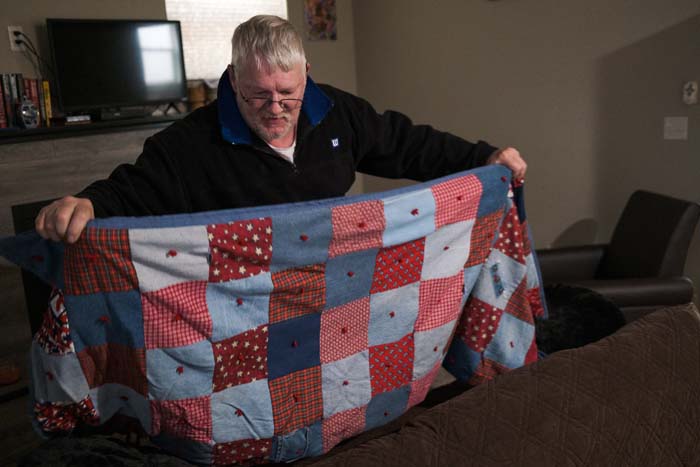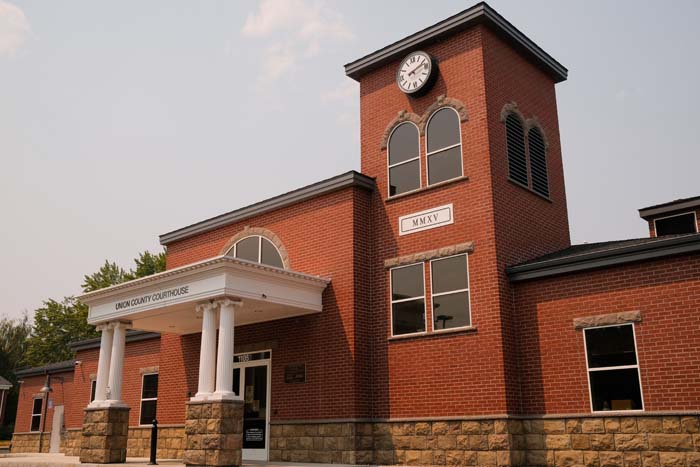New housing gives veterans a brand-new home and a fresh start
Published 7:00 am Tuesday, November 16, 2021

- Dennis Scudder tidies up his living room at Veteran's Village Union County on Tuesday, Nov. 9, 2021. Scudder was one of the first veterans to move into a permanent home at the new small-house community in La Grande.
LA GRANDE — For local veterans, a new housing area in La Grande offers a chance for a clean slate.
Trending
Veteran’s Village Union County, a micro-neighborhood of cottage-style homes, opened its doors to several veterans in need of housing on Wednesday, Nov. 3. The new homes provide homeless or low-income veterans with a safe, community-style living environment.
“This is my savior here, this place,” local army veteran Dennis Scudder said. “It’s a new place and a brand-new start.”
The village, on the corner of Russell Avenue and N. Pine Street, features small fully furnished homes. Each unit includes a bedroom, living room, amenities and a fenced backyard. The first three units are completed and have new occupants, while construction on the remaining seven houses is still wrapping up.
Trending
Creating a community
Gust Tsiatsos, owner of GCT Land Management, spearheaded the project after seeing a need for affordable housing in La Grande. The project involves Veterans Affairs, which finds veterans who meet the guidelines to live in the village, and Northeast Oregon Housing Authority is set to manage the property.
“The need was substantial after we did some research on what that need really looks like,” Tsiatsos said. “We just tried to create a community feel where they would be living with similar types of folks.”
Brian Blais, the Veterans Services Officer at the Center for Human Development, conducts the general screening process and worked closely with Tsiatsos in the planning process. He emphasized that there is a major need for aid to homeless veterans.
“The housing shortage isn’t a veteran-specific problem by any means, but it is estimated that there are over 1,300 homeless veterans in Oregon, and I am honored to be able to support my brothers and sisters who served our country,” Blais said. “Working with Gust has been an amazing experience, and I look forward to continuing the work that we do.”
The project is roughly 75% grant funded, according to Tsiatsos. The bulk of that funding came from Oregon Housing and Community Services. Tsiatsos noted that there is specific grant funding for veterans in rural areas, which helped the Veteran’s Village Union County score very well in the grant application process.
A major goal of the housing project is to foster a community of individuals with similar life experiences. Tsiatsos said the setup of the village allows the veterans to be as social as they would like, or have privacy if that is preferred.
“We have learned that this population of people has an interest in being in a more private setting and more of a closed community,” he said. “We situated all the houses facing in and put up a private fence around it. We’re hoping that a small, controlled space will be good for that demographic.”
Upon moving into his new home, Scudder echoed Tsiatsos’ sentiment.
“I am looking for a clean and sober place,” Scudder said. “Us veterans here try to stick together. There are a lot of veterans, including myself, that have issues.”
The Army veteran said he deals with PTSD and finds that being around other like-minded individuals is a major positive. The U.S. Department of Veterans Affairs estimates that anywhere from 10% to 20% of all veterans live with PTSD.
A long-term home
Scudder was homeless prior to moving into Veteran’s Village Union County, and he said there are many other veterans struggling. Scudder emphasized that the village gives a fresh start to veterans who need a safe and reliable place to live.
“No drugs or anything are allowed. This is the perfect environment,” he said. “I’m not a people person. My issues are more of a personal matter. Being around other veterans will be nice. I couldn’t ask for more. I’m so happy.”
Tsiatsos noted that a vital part of the project is to create permanent housing instead of a temporary stay.
“We wanted it to be a place someone could call home for 20 years,” he said. “We’re hoping to create an environment where people will live long term.”
Scudder found out about the veterans village through his VA social worker, Angel Smith. Through a program called HUD-VASH, veterans go through a screening process similar to the Section 8 housing process. The program guides veterans in need of rental assistance who have experienced homelessness.
The housing authority does the financial screening and background checks, while Smith provides ongoing case management, drug and alcohol counseling and any other services the veterans may need for at least a year after finding a new residence. The aim is to make sure the veterans are able to stay successfully housed.
“It really is a great program for veterans,” Smith said.
The HUD-VASH program bases rental rates on gross monthly income adjusted according to the individual’s needs, including obstacles such as mental health, drug and alcohol abuse or physical disabilities.
For the soon-to-be 10 veterans residing in the village, the opportunity for community and camaraderie will be a key feature of daily life. The community center at the front of the village will provide a shared space where the residents can mingle if they choose.
“It helps promote an environment where veterans can help each other out,” Blais said.
Scudder is looking forward to playing pool and hanging out in the community center, where the veterans in the village can meet up and socialize.
“For a lot of the veterans that have sobriety issues, you don’t have to go out to the bar to play some pool. You can stay right here,” Scudder said.
Gold standard
Tsiatsos said he thinks Veteran’s Village Union County is a model that other communities can mirror to alleviate veteran homelessness.
“We’re hoping that maybe other communities will come see this and try to model a similar design. It doesn’t have to be permanent, but I think permanent housing is more rare than transitional, so to me there’s more value to a community there,” Tsiatsos said. “I think once people see that and see that the livability is sustainable, then it might be something other communities will want to do.”
Having been homeless himself and knowing many veterans who face similar issues, Scudder emphasized that communities like Veteran’s Village Union County can be life changing.
“I feel like a whole person again,” Scudder said. “I can’t tell you how excited and thrilled I feel.”
GCT Land Management is in the process of creating another veterans village in Baker City, which will include nine one-bedroom homes and three two-bedroom homes.
The city of La Grande and the planning commission adopted a code change in 2018 that allowed for the construction of cottage-style homes and small dwelling units. Tsiatsos was the first to make major plans after the code change, bringing the veterans village to life.
“It’s one of those things Gust became more and more passionate about and got a lot of folks behind it,” La Grande Community Development Director Mike Boquist said. “The city is very supportive of his project.”
Boquist noted that the village helps mitigate the need for affordable housing in La Grande, especially for those who are semi-homeless or on the verge of homelessness.
“I think it’s a good start,” Boquist said. “Hopefully other people will see this and take advantage of it. It doesn’t necessarily have to be for the same housing market or clientele.”
Smith also would like Union County Veteran’s Village to set a precedent for what can be done to create affordable housing.
“We’re working with the state to kind of make this the gold standard,” she said. “It’s spreading and there is a lot of interest in the state in places like this. It’s really exciting.”
A new beginning
For Scudder and the future veteran tenants of the village, the micro-neighborhood provides an essential piece in getting back on one’s feet — a place to call home.
With the goal of creating a model to help veteran homelessness around the state, Tsiatsos has spoken with other communities about similar possibilities.
“Most of the communities now have the cottage home ordinance in place, so they can bring that density into their communities because housing is in such short supply across the nation right now,” he said. “Being able to find something like this that’s permanent isn’t always readily available.”
GCT Land Management is undertaking a tiny home initiative, which will send supplies necessary to create cottage-style homes in other communities that model Veteran’s Village Union County. The affordability can benefit not just veterans, but anyone in need of housing.
At La Grande’s newest neighborhood, hopes are high for the future of the village and its residents.
“I’m really happy with the place,” Scudder said. “I wish they would do this for more people. It’s great.”









